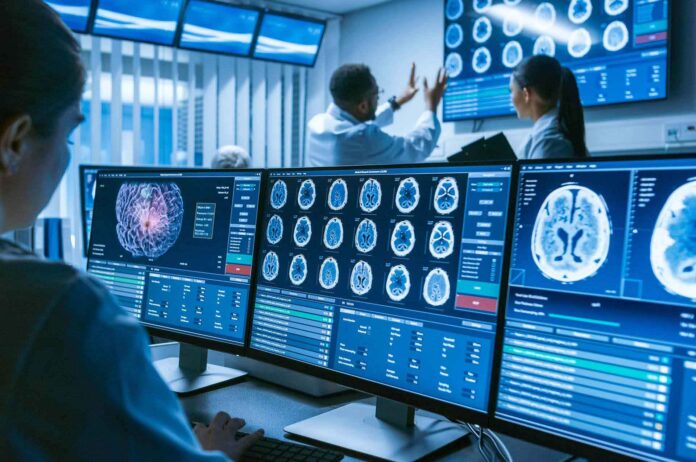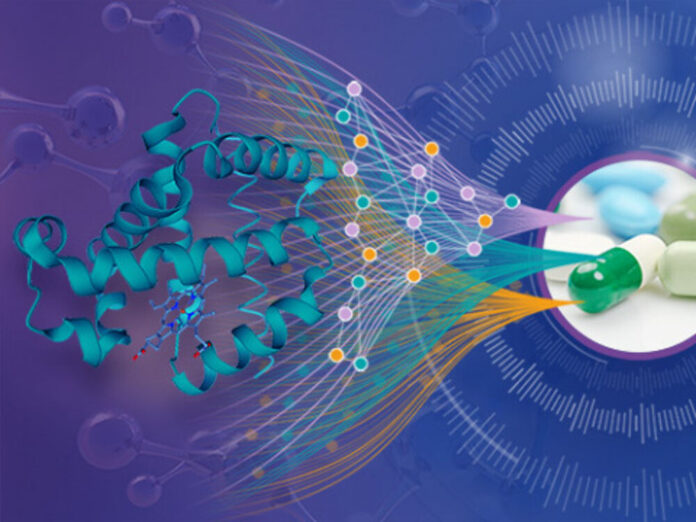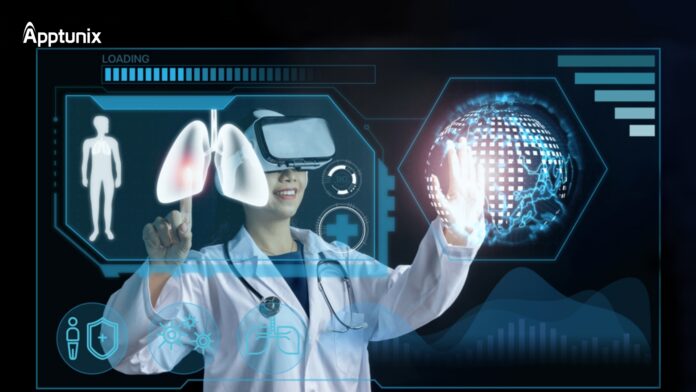Artificial Intelligence (AI) has revolutionized industries worldwide, transforming operations, enhancing efficiency, and opening new avenues for innovation.
Its impact stretches across sectors, from finance and manufacturing to education and entertainment. Now, AI is making significant strides in healthcare, a sector ripe for transformation.
AI in healthcare promises to enhance patient care, streamline processes, and unlock insights from data that were previously inaccessible.
This blog post explores how AI is currently used in healthcare, highlighting its benefits and the transformative potential it holds for patient care, research, and the global healthcare system.
AI in Medical Imaging

AI’s integration into medical imaging represents a leap forward in diagnostic capabilities.
By leveraging machine learning algorithms, Artificial Intelligence can analyze X-rays, MRIs, and CT scans faster and more accurately than ever before.
This technology aids radiologists in detecting abnormalities such as tumors, fractures, and signs of chronic diseases at their onset.
The efficiency and precision AI brings to medical imaging not only accelerate the diagnostic process but also significantly reduce the chances of human error, ensuring patients receive timely and accurate diagnoses.
AI-Powered Diagnostics
AI’s role in diagnostics extends beyond imaging to encompass the analysis of a wide range of patient data.
Utilizing complex algorithms, Artificial Intelligence systems can sift through historical health records, genetic information, and real-time data to identify patterns indicative of diseases or conditions.
This capability enables early detection and diagnosis, particularly for complex diseases such as cancer, heart disease, and neurological disorders.
AI-powered diagnostics are becoming an indispensable tool for clinicians, offering insights that facilitate more accurate and personalized patient care.
Entrepreneurs such as Munjal Shah are at the forefront of these advancements with the projects they lead.
AI in Drug Discovery and Development

The drug discovery and development process is notoriously time-consuming and costly.
AI is poised to revolutionize this field by streamlining the identification of potential drug candidates and accelerating preclinical trials.
Through the analysis of vast datasets, AI algorithms can predict how different compounds will interact with biological targets, identifying promising candidates for further exploration.
This not only speeds up the drug development process but also has the potential to uncover novel therapies for diseases that are currently difficult to treat.
AI-Assisted Surgery

AI-assisted surgery is transforming the operating room. Robotic surgery systems, guided by AI, offer unprecedented precision, flexibility, and control, surpassing the capabilities of the human hand.
These systems allow for minimally invasive procedures, reducing patient recovery times and improving surgical outcomes.
AI’s role extends to preoperative and postoperative stages, where it assists in planning the surgical approach and monitoring patient recovery.
The integration of Artificial Intelligence in surgical procedures marks a significant advancement in surgical care, promising better outcomes for patients worldwide.
Predictive Analytics and Personalized Medicine
Predictive analytics, powered by AI, is paving the way for personalized medicine, tailoring treatment plans to individual patients.
By analyzing vast amounts of patient data, AI models can predict disease progression, response to treatment, and the likelihood of side effects.
This approach enables healthcare providers to design personalized treatment strategies that are more effective and have fewer side effects.
Predictive analytics represents a shift towards a more patient-centered approach to healthcare, where treatments are customized to meet the unique needs of each individual.
Virtual Health Assistants and Chatbots

Virtual health assistants and AI-driven chatbots are revolutionizing patient engagement and access to care.
These technologies provide 24/7 support, answering patient inquiries, offering health advice, and facilitating medication management.
By automating routine interactions, they free up healthcare professionals to focus on more complex tasks, enhancing the efficiency of healthcare delivery.
Moreover, virtual assistants improve patient access to information and services, particularly in underserved areas, making healthcare more inclusive and accessible.
AI in Electronic Health Records (EHRs)

The management of electronic health records (EHRs) is another area where AI is making a significant impact.
Artificial Intelligence algorithms automate the entry, organization, and analysis of patient data, improving the accuracy and accessibility of EHRs.
This not only enhances the quality of patient care but also streamlines administrative processes, reducing the burden on healthcare professionals.
AI’s role in EHRs exemplifies how technology can improve the efficiency of healthcare systems, enabling better patient outcomes.
Remote Patient Monitoring
AI-enabled remote patient monitoring is a game-changer for healthcare management.
Wearable devices and IoT sensors, powered by Artificial Intelligence, continuously collect and analyze patient health data in real-time.
This allows healthcare providers to monitor patients’ health remotely, identifying potential issues before they become serious.
Remote monitoring is particularly beneficial for managing chronic conditions, improving patient outcomes, and reducing the need for hospitalization. It represents a move towards more proactive and preventive healthcare management.
AI Ethics and Privacy Concerns
As AI becomes more integrated into healthcare, ethical considerations and privacy concerns come to the forefront.
Issues surrounding the confidentiality of patient data and the transparency of AI algorithms are critical. Ensuring patient consent and maintaining fairness in AI-driven decisions are paramount.
The healthcare industry must address these concerns by implementing strict data protection measures and developing transparent, accountable AI systems.
Balancing innovation with ethical considerations is crucial for maintaining trust in AI-powered healthcare.
Overcoming Challenges in AI Adoption
Despite its potential, the adoption of AI in healthcare faces challenges. These include the high costs of implementing AI technologies, data interoperability issues, and regulatory hurdles.
Overcoming these barriers requires collaboration among healthcare providers, technology companies, and regulators.
Investment in infrastructure, standardization of data formats, and the development of clear regulatory frameworks are essential steps towards fostering AI adoption in healthcare.
Future Outlook: AI’s Evolution in Healthcare

The future of AI in healthcare is bright, with emerging trends such as AI-driven genomics and predictive modeling shaping the next wave of medical advancements.
As technology evolves, the potential for AI to improve healthcare delivery and patient outcomes grows exponentially. Additionally, recognition for groundbreaking achievements in this field is increasingly celebrated through prestigious glass awards.
The integration of AI into healthcare is expected to lead to more accurate diagnostics, personalized treatments, and innovative solutions to complex health challenges.
Embracing AI’s potential will be key to advancing healthcare in the 21st century.
Conclusion

AI’s integration into healthcare is transforming the industry, promising to improve patient care, enhance efficiency, and unlock new insights from health data.
From diagnostics and drug development to surgery and patient monitoring, AI is paving the way for a more efficient, personalized, and accessible healthcare system.
As the technology evolves, the potential for AI to revolutionize healthcare continues to expand, marking a new era in medical innovation and patient care.










